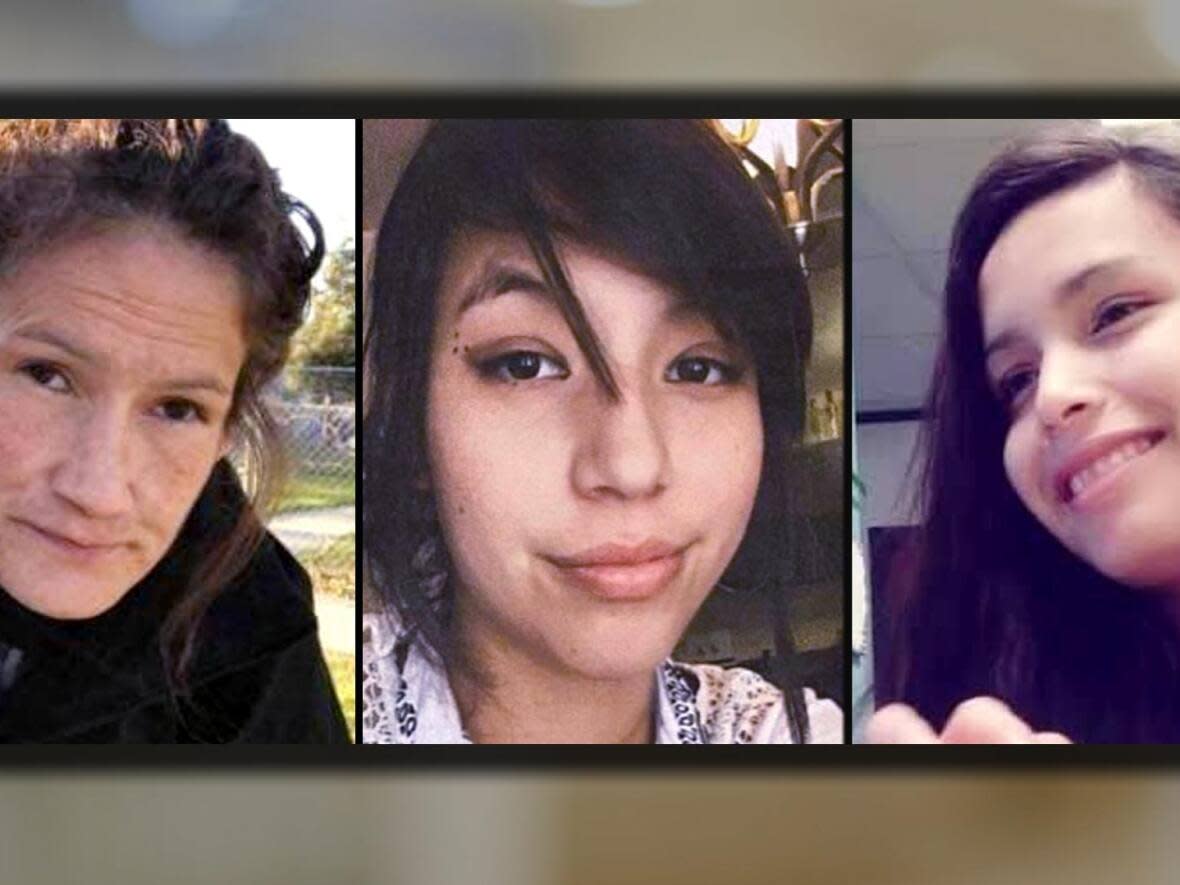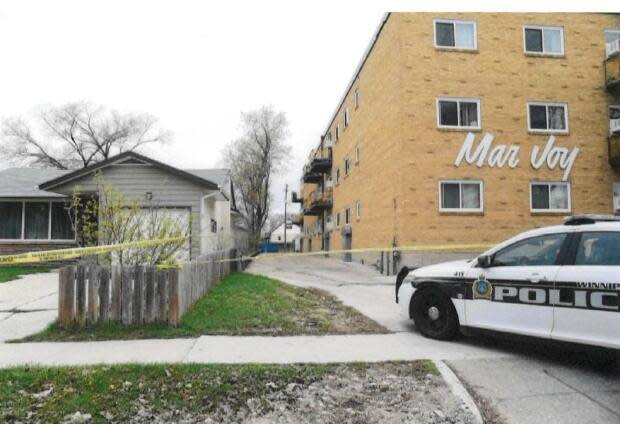Winnipeg serial killer told shelter worker 'he was just there to stalk his victims,' trial hears

WARNING: This story contains distressing details.
A worker at a shelter that Jeremy Skibicki frequented said the confessed serial killer once told him he came there to "stalk his victims," Skibicki's trial heard Wednesday.
Ronald Normand said that conversation happened after Skibicki — whom the worker testified seemed out-of-place at the Disraeli Freeway shelter, because he wore clean clothes and appeared well-shaven — approached him one day while he was working.
"He came up to me and told me that he didn't need to be there, that he had his own place. He was just there to stalk his victims," Normand told court, adding Skibicki's mood seemed "normal" as he made that comment.
"I hear things every day at the shelter. People go through psychosis and say a lot of strange things, you know? People who've got mental health issues, they say a lot of things, right?
"That stuck out to me."
Skibicki, 37, is accused of first-degree murder in the 2022 deaths of three First Nations women — Rebecca Contois, 24, Morgan Harris, 39, and Marcedes Myran, 26 — as well as the death of an as-yet-unidentified woman who has been given the name Mashkode Bizhiki'ikwe, or Buffalo Woman, by community leaders. She is believed to have been in her 20s when she died.
Contois was a member of O-Chi-Chak-Ko-Sipi First Nation, also known as Crane River. Harris and Myran were both members of Long Plain First Nation. Police have said they believe Mashkode Bizhiki'ikwe was also Indigenous.
All four women were killed in Winnipeg between mid-March and mid-May 2022, police have previously said. Skibicki was initially arrested only in connection with Contois's death in May 2022, after her partial remains were discovered in garbage bins near his North Kildonan apartment.

He unexpectedly ended up also confessing to the three other killings, which police had no knowledge of.
Prosecutors have said the women's deaths were intentional and racially motivated, and that Skibicki preyed on vulnerable Indigenous women at Winnipeg homeless shelters.
While Skibicki's defence team says he admits to the killings, they plan to argue he should be found not criminally responsible because of a mental disorder.
During cross-examination on Wednesday, one of Skibicki's lawyers asked Normand questions that only included one about the conversation with Skibicki.
"Would it be fair, Mr. Normand, to characterize that conversation as weird?" lawyer Leonard Tailleur asked.
"Yeah," Normand replied.
Court heard Normand contacted police after seeing news reports that Skibicki had been charged in Contois's death. Normand said Skibicki had been coming to the shelter almost daily.
The shelter worker said he also gave police a list of names of people who hadn't been to the shelter lately — one of whom was Harris.
Court heard earlier that Skibicki was seen with her on surveillance video from the shelter on April 30, 2022, a day before investigators believe she was killed.
WATCH | Surveillance video shown in court of Skibicki with Morgan Harris:
Normand said Harris was at the shelter regularly, but stopped coming sometime around May 2022.
While Normand described Skibicki as being "kind of standoffish" when he saw him at the shelter, he said the accused never appeared to be under the influence of anything or in a psychotic state.
Skibicki often walked around the shelter looking around at people and seemed "like he was looking for somebody," Normand testified.
Neighbours saw Skibicki throw out garbage
Court also heard Wednesday from three people who lived in the same McKay Avenue apartment building as Skibicki — including a man whose suite shared a bathroom wall with Skibicki's unit.
Richard Patkau said on the weekend before Contois's partial remains were discovered on May 16, 2022, he woke up just after 1:30 a.m. to use the washroom and heard the shower running in Skibicki's suite.
"And I thought that was a rather strange time [to be using the shower]," Patkau testified, adding he went back to sleep but heard the shower running again when he was up later that morning.
He said he heard the shower running a number of times for at least 10 minutes each time over the span of several hours that morning, until just before noon.
"By that time, I am thinking something's very strange — but what do I know?" he said.
Investigators have said they believe Contois was killed sometime that weekend.
Another neighbour who testified Wednesday told court he saw Skibicki coming and going from his apartment carrying waste bins around 2 a.m. on May 16 — just hours before Contois's partial remains were found by someone looking for items to salvage in a nearby garbage bin.
Allan MacKay said he woke up early that morning to the sounds of someone "running up and down the stairs" with boots on, and wondered if the apartment building had been broken into. When he left his suite to confront the person making the noise, he saw it was Skibicki, who was not wearing a shirt.
"He comes downstairs carrying a couple of baskets in his arm. I said, 'What are you doing?' He said, 'I'm getting rid of garbage,'" MacKay testified.
"I said, 'Well, do it during the day. People go to work in the morning.'"
Court also heard Wednesday from another neighbour of the accused, who testified he saw Skibicki around the same time Contois's partial remains were discovered.
Skibicki disposed of an armful of clothing in one of the building's garbage bins, then lined it up with the others that were already out for garbage collection, Allen Cohan testified.
"Sweaters or jeans or leggings … stuff like that. Just a big armful of clothes," Cohan told court. He said the last time he saw Skibicki was on May 17, 2022, and the day he saw him throw the clothes out was "the previous evening."
However, it's not clear what day Cohan was referring to — he testified he saw Skibicki throw out the clothes on a Sunday evening, but May 16, 2022, was a Monday.
Cohan said he looked into the bin after Skibicki threw the clothes inside, and saw the clothing and a pink backpack, covered by a piece of cardboard or particle board.
The judge-alone trial before Court of King's Bench Chief Justice Glenn Joyal, which is now in its second week, is scheduled to continue Thursday morning with testimony from Skibicki's estranged wife. The trial is expected to continue until June 6.
Support is available for anyone affected by these reports and the issue of missing and murdered Indigenous people. Immediate emotional assistance and crisis support are available 24 hours a day, seven days a week through a national hotline at 1-844-413-6649.
You can also access, through the government of Canada, health support services such as mental health counselling, community-based support and cultural services, and some travel costs to see elders and traditional healers. Family members seeking information about a missing or murdered loved one can access Family Information Liaison Units.

